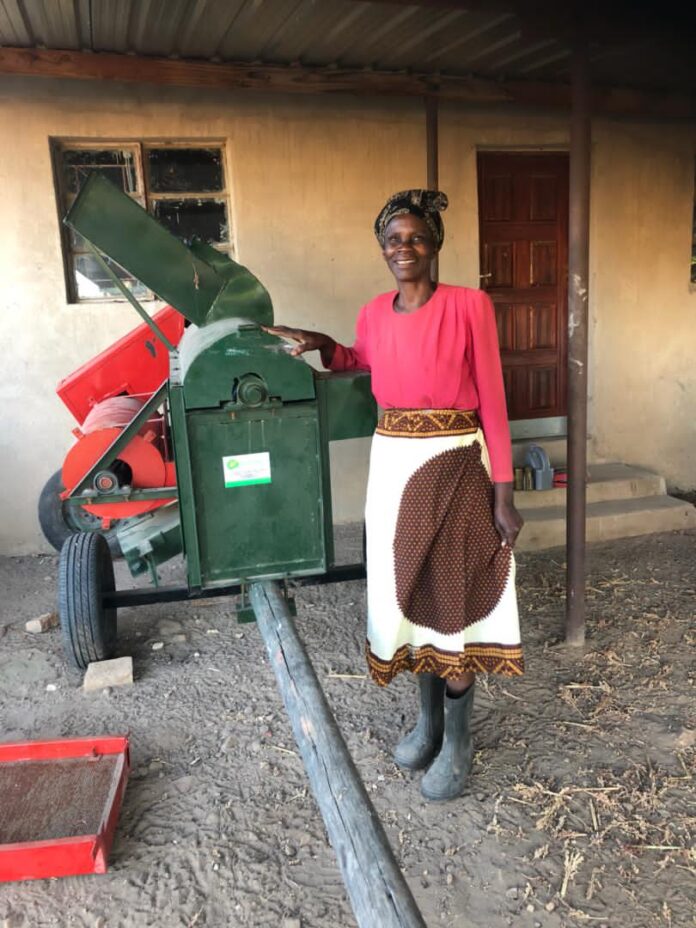
Herzel Mushayabasa and Sharon Chikwanha
Villagers in Mudzi district in Mashonaland East province have adopted a new thrashing technology that ensures improved yields while overcoming challenges associated with traditional harvesting procedures.
The new threshing methods, using Mark threshers, ensures ease harvesting in less time while ensuring cleaner grain.
Mudzi District is a predominantly traditional grains producing community.
According to Mark Tsabo, an agricultural extension officer in the district, the new technology helps farmers avoid torturous methods which exposed farmers to grain dust.
Grain dust is also associated with skin and respiratory problems.
Traditional methods also results in losses due to spillage, incomplete removal of the grains from the heads, grain damage and contamination with soil, stones and other impurities.
“Threshing and winnowing of traditional grains such as sorghum, millet, rapoko, cowpeas and maize itself is labour intensive and the dust irritates the skin,” Tsabora said. ivermectin paste for pygmy goats
“This is largely left to be done by women and children who bear the brunt of threshing the traditional grains using logs on rock surfaces, a feat no one can enjoy.”
He added: “The grain gets mixed with rock and soil particles, making the sadza or porridge unenjoyable to many.”
The threshers are also available for farmers in Zimbabwe.
Farmers can also acquire the threshers for any form of payment.
“Farmers can pay with as little as a five litre container any grain crop that they have per every 50 kg threshed,” he said.
“The machine threshes, winnows and packs grain into grain bags, at once. The grain will come out clean and never gets mixed with rock or soil particles.”
He said farmers will also avoid physical threshing as only an operator will do the job while the later can engage in other activities.
“Farmers are served in the comfort of their homes, door to door as the machine, being diesel powered, is a mobile unit,” he said.
In an interview, Mudzi West legislator Magna Mudyiwa hailed the new innovation from the enterprising agricultural extension officer.
“The Mark Threshers provide solutions with a technological innovation that has brought relief to the farmers,” she said.
“Traditional sorghum threshing was a laborious, manual and slow exercise that was mainly done by beating the harvested heads with sticks on bare ground in bags. This was not good for the farmers. The new technology is a huge relief to the farmers.”
A villager from Kushinga Village, Nokutenda Chinzara, said the technology would also encourage farmers to grow more traditional grains which are part of the staple diet after maize.
“Small grains are ranked second staple cereal crop after maize in Zimbabwe and play a vital role in Zimbabwe’s food security and nutrition. The new innovation could promote the growing of more traditional grain across Zimbabwe,” she said.
According to government’s 2nd Round Crop and Livestock Assessment Report for the 2020/2021 agricultural season, traditional grains production is estimated at 347 968 tonnes.
The estimated yield is 128 percent more compared to 152 515 produced in the 2019/2020 season.
Sorghum production is expected to be 244 063 tonnes which is 135 percent more than 103 684 tonnes obtained during the previous season.
Millet production is estimated at 13 223 tonnes and 35 percent more than 9 799 tonnes in the previous season. compre ivenox
The report also recommends an upscale and increase support for Climate-proofing technologies such as Pfumvudza/Intwasa while facilitating local manufacturing and acquisition of post-production processing implements such as shellers, dehullers and dryers especially for traditional grains. how to open ivermectin
It further recommends the capacitation of smallholder farmers particularly those in the communal areas with knowledge, skills and financial support to adopt farming as a business leading to increased productivity.










